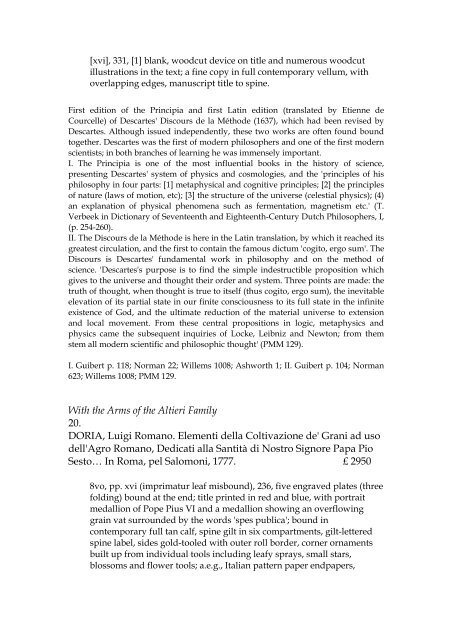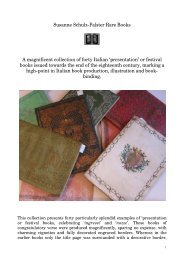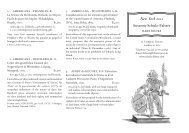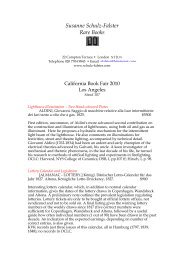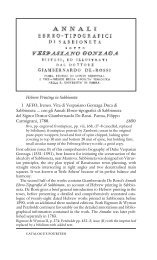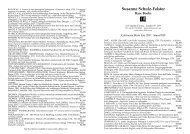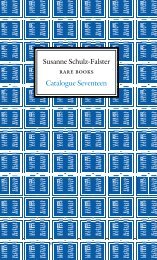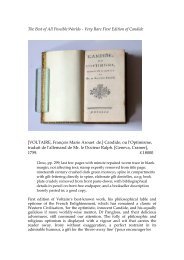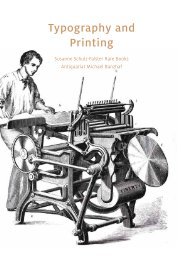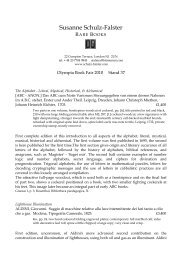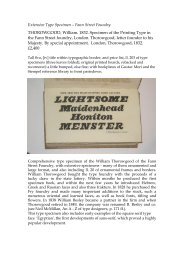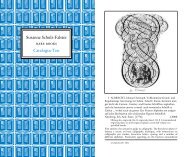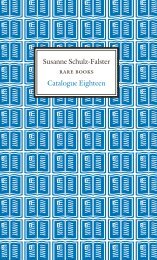«Merge Record #»«Title» - Schulz-Falster Rare Books
«Merge Record #»«Title» - Schulz-Falster Rare Books
«Merge Record #»«Title» - Schulz-Falster Rare Books
Create successful ePaper yourself
Turn your PDF publications into a flip-book with our unique Google optimized e-Paper software.
[xvi], 331, [1] blank, woodcut device on title and numerous woodcut<br />
illustrations in the text; a fine copy in full contemporary vellum, with<br />
overlapping edges, manuscript title to spine.<br />
First edition of the Principia and first Latin edition (translated by Etienne de<br />
Courcelle) of Descartes' Discours de la Méthode (1637), which had been revised by<br />
Descartes. Although issued independently, these two works are often found bound<br />
together. Descartes was the first of modern philosophers and one of the first modern<br />
scientists; in both branches of learning he was immensely important.<br />
I. The Principia is one of the most influential books in the history of science,<br />
presenting Descartes' system of physics and cosmologies, and the 'principles of his<br />
philosophy in four parts: [1] metaphysical and cognitive principles; [2] the principles<br />
of nature (laws of motion, etc); [3] the structure of the universe (celestial physics); (4)<br />
an explanation of physical phenomena such as fermentation, magnetism etc.' (T.<br />
Verbeek in Dictionary of Seventeenth and Eighteenth-Century Dutch Philosophers, I,<br />
(p. 254-260).<br />
II. The Discours de la Méthode is here in the Latin translation, by which it reached its<br />
greatest circulation, and the first to contain the famous dictum 'cogito, ergo sum'. The<br />
Discours is Descartes' fundamental work in philosophy and on the method of<br />
science. 'Descartes's purpose is to find the simple indestructible proposition which<br />
gives to the universe and thought their order and system. Three points are made: the<br />
truth of thought, when thought is true to itself (thus cogito, ergo sum), the inevitable<br />
elevation of its partial state in our finite consciousness to its full state in the infinite<br />
existence of God, and the ultimate reduction of the material universe to extension<br />
and local movement. From these central propositions in logic, metaphysics and<br />
physics came the subsequent inquiries of Locke, Leibniz and Newton; from them<br />
stem all modern scientific and philosophic thought' (PMM 129).<br />
I. Guibert p. 118; Norman 22; Willems 1008; Ashworth 1; II. Guibert p. 104; Norman<br />
623; Willems 1008; PMM 129.<br />
With the Arms of the Altieri Family<br />
20.<br />
DORIA, Luigi Romano. Elementi della Coltivazione de' Grani ad uso<br />
dell'Agro Romano, Dedicati alla Santità di Nostro Signore Papa Pio<br />
Sesto… In Roma, pel Salomoni, 1777. £ 2950<br />
8vo, pp. xvi (imprimatur leaf misbound), 236, five engraved plates (three<br />
folding) bound at the end; title printed in red and blue, with portrait<br />
medallion of Pope Pius VI and a medallion showing an overflowing<br />
grain vat surrounded by the words 'spes publica'; bound in<br />
contemporary full tan calf, spine gilt in six compartments, gilt-lettered<br />
spine label, sides gold-tooled with outer roll border, corner ornaments<br />
built up from individual tools including leafy sprays, small stars,<br />
blossoms and flower tools; a.e.g., Italian pattern paper endpapers,


